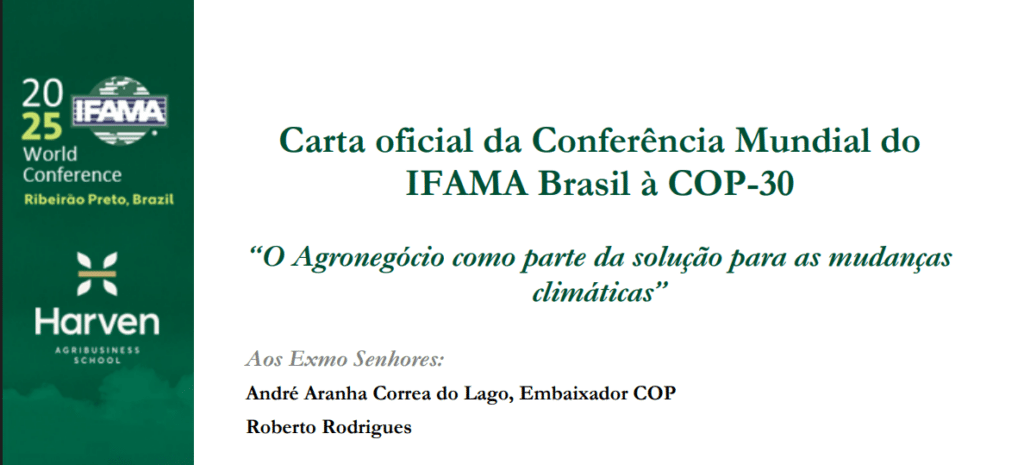
Ribeirao Preto, Brazil, 1 July 2025 (IICA) – The Director General of the Inter-American Institute for Cooperation on Agriculture (IICA), Manuel Otero, expressed his full support for the conclusions of the IFAMA Global Conference, where 600 representatives from 40 countries stated that the agricultural sector will continue to be part of the solution to global challenges, if it deepens its commitment to science and technology and promotes a new generation of public policies.
The annual event of the International Food and Agribusiness Management Association (IFAMA 2025)—one of the largest global conferences in the agricultural sector—concluded with the drafting and publication of a document that called for public policies and private strategies to promote greater use of technologies aimed at conserving resources, boosting productivity, and advancing environmental conservation.
The Director General of IICA was one of the speakers at the conference, which brought together scientists, policymakers, private sector representatives, researchers, professionals, and students, with strong participation from organizations in Brazil, the United States, Argentina, and the European Union. The meeting took place in Ribeirão Preto, the main agro-industrial center of Brazil, located in the state of São Paulo.
“The conclusions of the IFAMA World Conference align with the message that IICA has been delivering at all regional and international forums: agriculture is essential for global prosperity and peace. The sector plays an irreplaceable role not only in food security, but also in the economic and social development of countries, environmental sustainability, and energy security,” said Manuel Otero.
“Often, this reality is not fully understood,” he added, “which is why COP 30, in Belém do Pará, will be an opportunity that the agricultural sector of the Americas and the world must not miss, to share its message.”
Population growth
The conclusions of IFAMA 2025, drafted after four days of discussions, were presented in a letter addressed to André Corrêa do Lago, President of COP 30, and Roberto Rodrigues, Special Envoy for the agricultural sector to this global environmental forum, which will take place this coming November in Brazil and draw the world’s attention.
The document warned that the world faces the need to increase the production of food and bioenergy to meet the demands of a growing population, combat hunger, and protect the environment, making it essential to optimize resource use.
To achieve these goals, efforts must focus on expanding production horizontally through the restoration of currently degraded areas, and also on increasing productivity through innovation and new technologies.
Along these lines, the letter detailed the transformations and workstreams the agricultural sector is already implementing and plans to showcase at COP 30.
These include the use of sustainable production systems such as crop rotation, no-till farming, agro-silvopastoral integration, and the circular economy. There is also progress in the use of technologies applied to food production chains, including precision irrigation, drones and unmanned vehicles, artificial intelligence, and next-generation machinery and equipment.
Representatives of the global agricultural sector also stated in the conclusions that the use of bio-inputs should be expanded to reduce reliance on chemical products, along with the development of genetic improvements that support disease control and adaptation to pronounced climate variability.
The final text of the IFAMA 2025 global conference emphasized the contribution that the agricultural sector is making—and will continue to make—to the energy transition, through liquid biofuels and the use of production residues.
Lastly, it highlighted the importance of public policies that establish incentives for environmental conservation, including the creation of protected areas on rural properties or payments to producers who sequester carbon in the soil or in forests.
More information:
Institutional Communication Division.
comunicacion.institucional@iica.int











